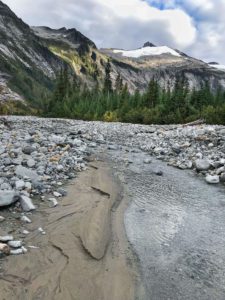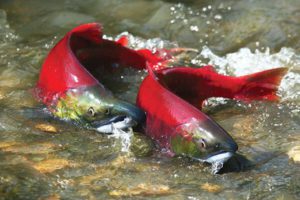Here’s the two-sentence story — An adjudication is a thorough analysis of a river system to make sure everyone who’s using water from it (individuals, cities, farms, and the fish living there) is getting the water they’re legally entitled to, because we don’t really know how much water is currently being used, and by whom. The Nooksack needs an adjudication to protect Tribal treaty rights and struggling salmon amid increasingly dry summers and climate change. Read on for what an adjudication in the Nooksack River — Whatcom County’s main waterway — might look like, and why it’s crucial for how we use water in the future.
In case you missed it, here’s a primer on Water Rights 101. Worth reading if you don’t know your water rights from your water lefts!
This past year, the state Department of Ecology has been deliberating, by state directive and funding, as to where to do a general stream adjudication, and the Nooksack River watershed was listed as one of the top priorities in 20191. Update, October 2nd, 2020: Ecology recommended the Nooksack for an adjudication in a report to the state legislature.
So what is a general stream adjudication? The simple answer: an adjudication clarifies who has legal rights to water from a particular waterbody. If the Nooksack watershed was chosen, Ecology would examine water rights claims and rights in the WHOLE watershed — including groundwater rights.
Here is Ecology’s more detailed explanation: “Adjudication is a Superior Court process that legally determines whether a water right is valid, how much water can be used, and its priority during shortages in a defined basin. It prioritizes each individual water right according to Washington water law’s “first-in-time, first-in-right” prior appropriation framework.”
The Nooksack needs an adjudication to protect Tribal treaty rights and struggling salmon in increasingly dry summers.
Lummi Nation and Nooksack Indian Tribe have lived here since time immemorial, and because they were the first water-users in the Nooksack watershed, they have the most senior (original) water rights. This water use allotted to the Tribes also means there must be enough water in streams to support fish habitat and their treaty right to fish. An adjudication would make sure their water rights are respected first, leaving enough water in the river to support salmon populations as well as people’s water needs on reservation.

The 1986 Nooksack Instream Flow Rule established flows to support fish and wildlife, recreation, and aesthetics; however, the rule was adopted relatively recently, making it junior (newer) to many senior (original) water users. In the summer and fall when water use is highest — and when fish need water most to spawn — flows required by the Nooksack Rule routinely are too low. Salmon cannot survive or reproduce when there’s not enough water to get to their spawning grounds, and low summer flows are a death sentence. These are some of the main reasons RE Sources supports an adjudication. Read our letter to Ecology here.
Let us be clear: there is enough water in the Nooksack watershed as a whole to meet current and anticipated future needs for people and farms. However, some smaller waterways like the South Fork Nooksack River and creeks coming from Canada, like Bertrand Creek, have water shortages in the summer where they are strained to support both spawning salmon and water withdrawals. The mainstem Nooksack River, Lake Whatcom, and most groundwater sources have enough water to serve the community’s needs.
Once Lummi Nation and Nooksack Indian Tribe’s off-reservation water rights are quantified, Ecology will look at how much water the junior water right holders can use. These water rights holders would likely have their rights revised to reflect how much water is left available. This could range from switching water sources — such as using groundwater instead of surface water directly from streams — slight reductions in water quantity, and so on.
Why adjudication? It will give everyone common ground to work from.
Knowing exactly who has rights to how much water is a vital baseline for making choices about this precious, shared resource. Without an adjudication, Ecology cannot properly regulate between water users that have actual water rights or just water claims — unverified water rights. An adjudication provides water certainty for all. Currently, many farmers and other users have operated in limbo or been granted water that’s not entirely legal. Examining ALL water rights levels the playing field and helps the Tribes keep their treaty-guaranteed right to fish.
 If we’re not thinking about how we can have water into the future for farms, fish, and people, we’re doing a disservice to all three.
If we’re not thinking about how we can have water into the future for farms, fish, and people, we’re doing a disservice to all three.
Also, climate change is upon us in Whatcom County — summer droughts are growing more frequent and more severe, with smaller mountain snowpacks accumulating in the winter to melt and replenish streams. If we don’t adjudicate, our community won’t be prepared to deal with water shortages and changes to water availability.
Ecology, Tribes, farmers, municipalities, environmental experts, and others have been working for several years to restore ailing streams but have not come to an agreement on how. Adjudication will clarify who has access to water and how much, and give everyone common ground to work from.
See this website made by Lummi Nation and Nooksack Tribe for their perspective on why a Nooksack adjudication is so important.
What does the adjudication process look like?
Ecology prepares for an adjudication by defining a water source and identifying all uses of that source, including streamflow. Water users, claimants, and the public all receive notice of the adjudication. Then Ecology files a lawsuit in state superior court (in Whatcom County Superior Court, if the Nooksack watershed is chosen) naming all users and claimants as defendants. Ecology assists water users by providing available state documentation of their water rights.
Water users may also present evidence of their historic water use. Any legal questions on the legal status of a water right are addressed by the court.2
The process can take a number of years. Like all legal processes, there is an option for settlement instead of prolonged court battles. Settlement between the state and water rights holders is encouraged under the law for adjudication.
Who would need to go through an adjudication?
Those who have water rights or water claims. In other words, individual people who receive water from a public or private entity like a city or a Public Utility District would not need to go through this process.
Questions? Contact Alexander Harris, Land and Water Policy Manager at alexanderh@re-sources.org
References
1. Department of Ecology, 2019-2021 Operating Budget, September 2018, page 301:
2. Department of Ecology, Focus on: Future Adjudications, November 2019:
Cover photo of salmon by Brett Baunton
